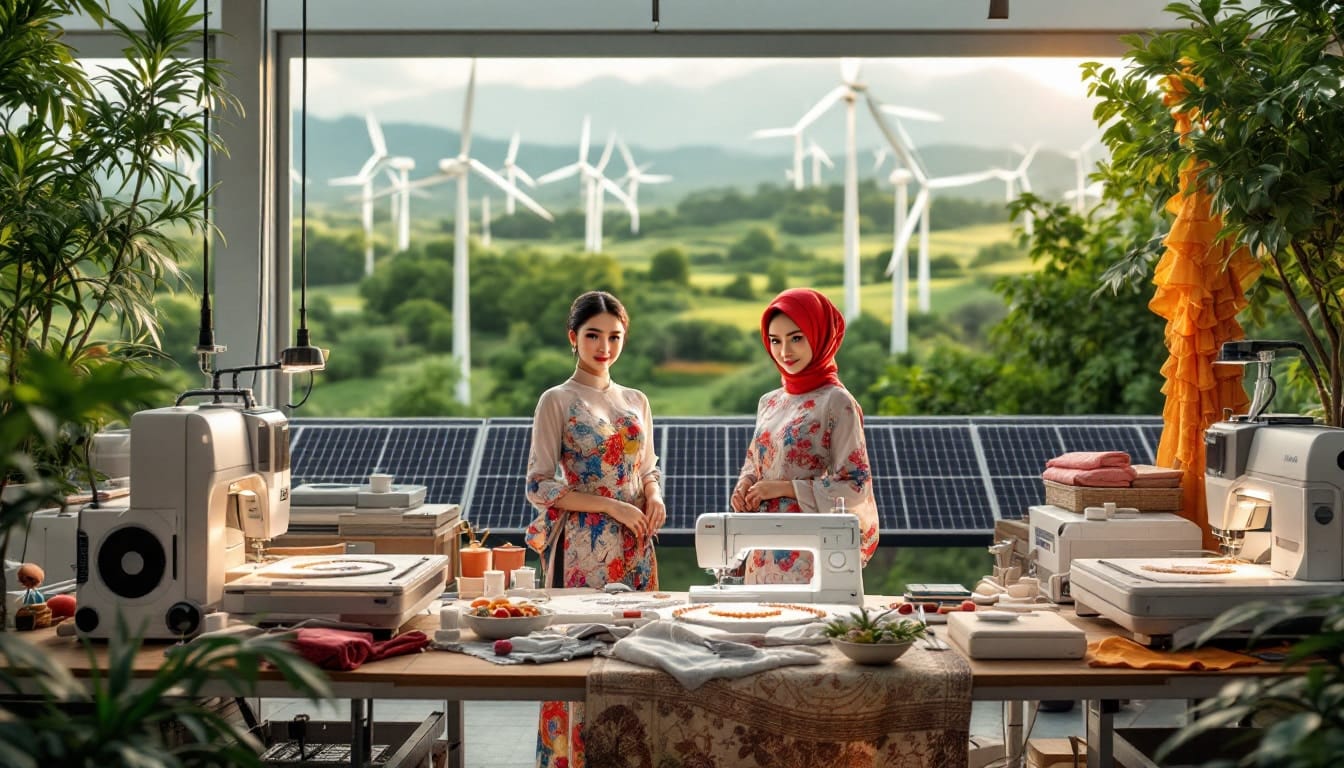Diving into the heart of the Indonesian industrial landscape reveals a mosaic of opportunities and challenges. With the advent of Industry 4.0, companies, from SMEs to large industries, are called to reinvent themselves. The rigorous selection of suppliers and the guarantee of product quality become strategic priorities.
In this changing context, understanding the advantages and disadvantages of producing in Indonesia is essential. The manufacturing sectors thrive thanks to a skilled workforce and abundant resources. However, companies must navigate through logistical challenges and constantly evolving regulatory requirements. The adoption of advanced technologies is becoming the key to enhancing the resilience of supply chains.
Table des matières
ToggleThe Rise of Indonesian Fashion in the Era of Industry 4.0
The Indonesia is undergoing a remarkable transformation in the fashion sector due to the adoption of Industry 4.0. This industrial revolution enables Indonesian manufacturers to integrate advanced technologies such as the Internet of Things (IoT) and artificial intelligence (AI) into their production processes. For example, companies like Tereos Indonesia have been recognized with the INDI 4.0 award, highlighting their ability to integrate these innovative technologies (source).
The adoption of Industry 4.0 in Indonesian fashion not only optimizes production but also improves product quality. Textile factories use automated systems to reduce human errors and increase productivity. Moreover, the integration of AI allows for more efficient inventory management and better demand forecasting, which is crucial in a dynamic sector like fashion.
Furthermore, Industry 4.0 facilitates mass customization, allowing brands to offer products tailored to individual consumer preferences. This ability to customize on a large scale enhances the competitiveness of Indonesian companies in the global market.
The Advantages and Challenges of Production in Indonesia
Producing in Indonesia presents numerous advantages for fashion companies. The country offers an abundant and relatively inexpensive workforce, reducing production costs. Additionally, Indonesia benefits from a strategic location in Southeast Asia, facilitating access to international markets. According to several studies, exports of textiles and textile products increased by 19% in 2021, reaching over 10 billion USD (source).
However, production in Indonesia is not without challenges. Ensuring product quality remains a major concern. Companies must carefully select their suppliers and establish rigorous quality controls to ensure that products meet international standards. Furthermore, the logistics infrastructure needs to be improved to avoid production delays and inefficiencies.
Another challenge is adapting to Industry 4.0. Although many companies have adopted advanced technologies, some small and medium-sized enterprises (SMEs) may struggle to keep pace due to a lack of resources or technical skills. Government initiatives aimed at supporting digital transformation are therefore essential to overcome these obstacles.
Integrating Sustainability in the Fashion Supply Chain
Sustainability has become a priority in the Indonesian fashion industry, especially with the advent of Industry 4.0. Companies are integrating sustainable practices into their supply chains to meet the growing expectations of consumers and environmental regulations. For example, the use of recycled materials and eco-friendly manufacturing processes helps reduce the carbon footprint of fashion products.
Moreover, Industry 4.0 facilitates the traceability of materials, ensuring greater transparency throughout the supply chain. This transparency is essential to guarantee that production practices meet environmental and ethical standards. Technologies such as blockchain can be used to track the origin of materials and verify their compliance with sustainability standards.
Additionally, waste reduction through optimized manufacturing processes is another key aspect of sustainability. Automated systems allow for better resource management and minimize waste, thus contributing to more environmentally-friendly production.
Government Initiatives to Support Industry 4.0
The Indonesian government plays a crucial role in supporting Industry 4.0 and the transformation of fashion. The “Making Indonesia 4.0” strategy launched in 2018 proposes ten national strategies to revitalize the manufacturing sector, with a particular focus on five priority industries, including fashion. This roadmap aims to improve productivity, encourage innovation, and promote digital transformation.
The Indonesian Minister of Industry stated that the implementation of this strategy will allow Indonesia to become one of the ten largest economies in the world by 2030. To achieve this ambitious goal, the government is investing in advanced technological infrastructure and offering tax incentives to companies that adopt Industry 4.0 technologies.
Furthermore, partnerships between the public and private sectors are encouraged to foster innovation. For example, PT Jababeka Tbk collaborates with academic institutions like President University to develop technological solutions tailored to the needs of the fashion industry. These collaborations facilitate knowledge transfer and the rapid adoption of new technologies.
The Future of Indonesian Fashion and Emerging Technologies
The future of fashion in Indonesia looks promising due to the continuous integration of emerging technologies from Industry 4.0. Innovations such as additive manufacturing, smart textiles, and advanced data analytics allow companies to create more innovative and customized products. For example, the use of AI to analyze fashion trends and predict consumer preferences helps brands stay competitive in the global market.
Moreover, 5G and emerging technologies are likely to propel the global manufacturing sector’s GDP to 11 trillion dollars by 2030. This presents vast opportunities for the Indonesian fashion sector to position itself as an innovative leader on the global stage. Companies that quickly adopt these technologies will benefit from a significant competitive advantage.
Additionally, initiatives aimed at promoting sustainability will continue to shape the future of fashion in Indonesia. Integrating sustainable practices into production and supply chains will ensure compliance with international standards while also enhancing the reputation of Indonesian brands among environmentally conscious consumers.
Finally, the emphasis on education and training in the field of Industry 4.0 is preparing a new generation of qualified professionals capable of driving innovation and addressing future challenges. Advanced training programs and collaborations with academic institutions are essential to maintain the dynamism and competitiveness of the Indonesian fashion industry.
Case Study: Tereos Indonesia
Tereos Indonesia is a shining example of success in integrating Industry 4.0 within the fashion sector. This company recently received the INDI 4.0 award, recognizing its commitment to innovation and automation of manufacturing processes. By adopting advanced robotic equipment and implementing intelligent management systems, Tereos has managed to increase its productivity while reducing operational costs (source).
This transformation has not only improved product quality but also enabled Tereos to respond more effectively to fluctuating demands from the international market. The company continues to invest in new technologies to maintain its competitive edge and contribute to the sustainable development of the fashion industry in Indonesia.
The Impact of Advanced Technologies on Production
The integration of advanced technologies such as AI and IoT is transforming production in the fashion sector in Indonesia. These technologies allow for better resource management, process optimization, and waste reduction, thus contributing to more sustainable and efficient production.
Moreover, some companies use blockchain to ensure complete traceability of materials, thus guaranteeing the authenticity and sustainability of finished products. This transparency enhances consumer trust and meets growing demands for social and environmental responsibility.
International Collaborations and Local Innovation
International collaborations play a crucial role in the development of Industry 4.0 in Indonesia. Partnerships with foreign companies and institutions allow for an exchange of knowledge and rapid adoption of global best practices. For example, Indonesian companies collaborate with European technology leaders to integrate innovative solutions into their production processes.
These collaborations also stimulate local innovation, encouraging companies to invest in research and development. Initiatives like the Industry 4.0 barometer, launched by MHP and LMU Munich, provide valuable insights and benchmarks to evaluate and improve Indonesian companies’ preparedness for the industrial revolution.
In addition, thought leaders like Onkar Nerkar and Andrew Jassy influence how Indonesian companies adopt and implement Industry 4.0 technologies. Their vision and expertise guide innovation strategies and facilitate the integration of advanced practices in the manufacturing sector.
Competitive Advantages Through Automation and Robots
Automation of manufacturing and the use of robots provide significant competitive advantages to fashion companies in Indonesia. By adopting advanced robotic equipment, manufacturers can enhance their accuracy and efficiency while reducing labor costs. This also allows for quicker responses to demand fluctuations and maintaining consistent product quality.
Robots can perform repetitive tasks with high precision, freeing human workers for more complex and creative tasks. This synergy between man and machine not only improves productivity but also enhances job satisfaction, contributing to a more dynamic and innovative work environment.
Additionally, automation enables better resource management, reducing waste and optimizing material usage. This aligns perfectly with sustainability goals, ensuring that fashion production in Indonesia is both efficient and environmentally friendly.
Digital Transformation in Service of Sustainability
Digital transformation is at the heart of sustainability efforts in the Indonesian fashion industry. Integrating digital technologies allows for more effective resource management and a significant reduction in waste. For instance, intelligent inventory management systems minimize surpluses and reduce losses while ensuring quick responses to demand fluctuations.
Moreover, utilizing AI to analyze production and consumption data helps companies identify inefficiencies and implement strategies to address them. This leads to more sustainable resource utilization and reduces the environmental impact of fashion production.
Digitizing processes also enables better traceability of materials, ensuring that production practices meet environmental and ethical standards. This transparency is essential to meet the expectations of modern consumers, who are increasingly concerned about the origin and impact of their consumption choices.
Future Prospects for the Fashion Industry in Indonesia
With the rapid advancement of Industry 4.0, the prospects for the fashion industry in Indonesia are extremely promising. Companies that quickly adopt emerging technologies are well positioned to take advantage of opportunities offered by globalization and the growing demand for innovative and sustainable fashion products.
Government initiatives, combined with international collaborations and local innovation, will create a favorable ecosystem for the growth and competitiveness of Indonesian companies. The emphasis on sustainability and digital transformation will not only meet global market expectations but also contribute to sustainable economic and environmental development.
Furthermore, increased investments in research and development will ensure continuous innovation, enabling the Indonesian fashion industry to stay at the forefront of technological trends and effectively respond to future challenges.
Thus, the alliance between fashion, Industry 4.0, and sustainability positions Indonesia as a major player in the global fashion sector, ready to tackle tomorrow’s challenges with innovation and responsibility.





